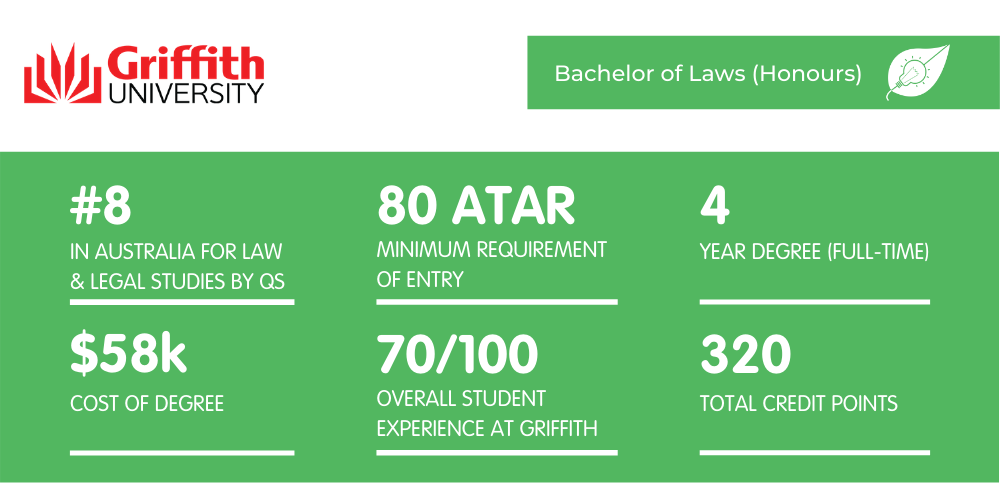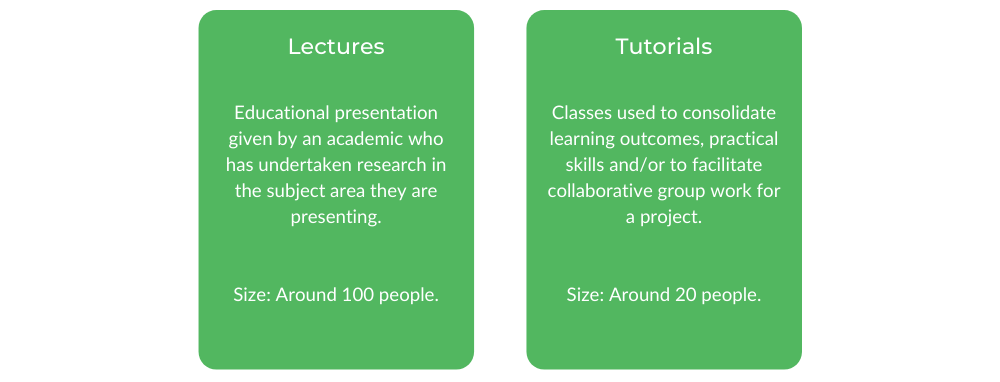
Are you considering a tertiary education path towards law because you want to make your mark in the world? Maybe studying Griffith Law has crossed your mind?
If completing a specialised Honours degree sounds appealing to you, then we’ve got all the info you need on a Bachelor of Laws (Honours) at Griffith!
Keep reading to find out exactly what this dynamic study path, located in the Gold Coast and Brisbane, entails.
What is a Bachelor of Laws (Honours) at Griffith University?
Core Units for this Degree
How to Get into Law at Griffith University
What’s the Teaching Format?
What’s the Faculty and Culture Like?
What is a Bachelor of Laws (Honours) at Griffith University?
This degree provides students with hands-on experience to make connections between laws, legal theory, ethics, Indigenous issues and internationalisation. Students take on different courses that cover all kinds of legal topics from crime, to property, to torts.
This degree also offers electives to students based on their personal interests, or driven by practical legal skills.
Honours is built-in to this degree, so as soon as you enrol, you’ll be on track. During your final year, you’ll be taking on bigger subjects that challenge your perceptions and practice of law.
Can this degree be studied in conjunction with another?
This degree can be studied either as a singular course for four years, or as a double degree. Degrees that can be added to a Bachelor of Laws include:
-
- Environmental Science
- Arts
- Business
- Commerce
- Criminology and Criminal Justice
- Government and International Relations
- International Business
- Psychological Science
Career Paths
Studying a Bachelor of Laws (Honours) can take you into a wide variety of careers. Some potential jobs include:
-
- Solicitor
- Barrister
- Policy advisor
- Human rights lawyer
- Journalist
- Political analyst
- Management consultant
To become a solicitor or work in a court, students need to complete Practical Legal Training, which will give you the final skills to become an entry-level lawyer. This must be completed after graduating.
To learn more about a career as a Lawyer, check out our article here!
Core Units for this Degree
This degree doesn’t offer any majors. As such, there’s a lot of core subjects that students undertake. These subjects are generally divided up by years. You can find them listed here:
First Year
As a first year student, these are the subjects you are required to complete:
-
- Foundations of Law
- Contracts 1 & 2
- Global Law
In this first year of study, students focus primarily on gaining an understanding at a glance of law and its functions, ready for more specific study as the degree progresses.
In Foundations of Law, students learn key legal concepts and the ways of understanding law that are used throughout Australia. Students also look at legal ethics and the role they play in governance.
In Contracts Law, it’s time to start understanding which promises are legally binding and how contracts are formed. Students also learn how to categorise a contract, and the different effects this may have.
Global law looks more broadly at the legal systems of other countries, including Brazil, France and Japan.
Second Year
In your second year, there are a lot more subjects that you’ll need to cover:
-
- Crime 1 & 2
- Torts 1 & 2
- Property 1 & 2
- Constitutional Law
- Administrative Law
During Crime subjects, you will learn about the laws of Queensland and the Commonwealth. Students gain an understanding of significant indictable offences, excuses, justifications and defences.
Fancy yourself a bit of a vigilante? Tort subjects will teach you all about civil wrongs. The is the body of principles aimed at compensating, rather than punishing victims of harm and distress.
In Property subjects, students are introduced to the fundamental elements of property law, assessing land, chattels and intangibles. You will learn how property is defined through concepts such as “ownership”, “title” and “possession.”
Constitutional Law is a big one — you’ll learn all about the laws that dictate how government institutions operate, including within their political, social and economic contexts. You’ll understand how laws are made in parliament according to the powers and limits of Australia’s Constitution.
Third Year
These are your third year subjects:
-
- Equity and Trusts
- Evidence
- Civil Procedure
- Corporations and Associations
In third year, you really start getting into the nitty-gritty. You’ll learn about some complex legal terms that may be applicable to your career.
Equity and Trusts explores the nature of equity and its relationship to common law. Students will look at the law relating to trusts and family settlements.
In Evidence Law, students will be introduced to the law governing proof in civil and criminal litigation. Students will learn the rules around judges and juries, standards of proof, admissibility of evidence, testimony and judicial warning (plus a lot more — this is a big course!).
Corporations and Associations is another big one. Students will learn about the law of associations and partnerships before looking at the nature and legal structure of corporation in Australia. Students are encouraged to examine these concepts through legal frameworks.
Fourth Year
Your fourth year core units include:
-
- Ethics and Professional Responsibility in Practice
- Theories of Law
Fourth year is the most flexible in a students’ study load, as you will take on two electives and just two core subjects.
Ethics and Professional Responsibility in Practice is a capstone course that encourages students to evaluate key aspects of ethical lawyering and professional responsibility. In this course, you will investigate concepts relevant to legal practice and contemporary issues that are changing the profession.
In Theories of Law, students extend on main traditions and themes in Western jurisprudence, integrating signature themes of a law degree. Students are engaged in critical reflection about the purpose of law in Australia. They also look at the process of law-making and interpretation through targeted readings and studies.
Internships
Whilst there are no compulsory internships for this degree, many electives offer them. Internships generally prioritise students who are close to graduating.
One example is the Innocence Project, where students work with supervising lawyers on cases of wrongful convictions.
How to Get into Law at Griffith University
The minimum ATAR for this degree is 80 through QTAC, or through UAC for NSW and ACT students. Students must also have completed Year 12, including an English subject.
Alternate Pathways
Griffith University also offers a Guaranteed Admissions Scheme to students who have met subject prerequisites and ATAR requirements.
The Admission Scheme for Year 12 Early Offer was expanded in 2020. Students who retain a passing grade in five General subjects (including English), with a grade of 70% or higher in two of those subjects, are eligible.
Law is not currently listed under the Guaranteed Admissions Scheme. However, you may be able to use this scheme to get into a different degree, before transferring to Griffith Law.
Scholarships
Griffith has a number of scholarships that can be found here.
One of the most significant is a Sir Samuel Griffith Scholarship, available to high-achieving students who are commencing tertiary study for the first time. If you are a Year 12 leaver with an ATAR of 95.50 or above, you may apply!
What’s the Teaching Format?
Griffith University is based on trimesters, of which the third trimester is a non-compulsory teaching session. Therefore, most students undertake the bulk of their classes in Trimesters 1 and 2, but have the opportunity to get ahead in summer.
Each class involves roughly 4 face-to-face (or online) classes per week.
Class Structure

Lectures
(100 plus)
Students receive a 2-hour, in-person lecture per subject, with around 100 students in attendance. These lectures involved students being taught topics relevant to each subject in a teacher-student setting.
Often, lectures cover a wide array of topics that are relevant to a specific legislation. Lectures are also pre-recorded and posted online.
Tutorials
With approximately 20 students in attendance, tutorials are an opportunity for students to break into small groups and put theory into practice. These classes generally run for two hours and allow students to apply what they have learnt to real legal scenarios.
As these are smaller and compulsory classes, it is also a great chance to ask your tutor detailed questions about the subject or its application.
How much time do you spend on campus?
Each subject has roughly four hours of class-time a week. Times that by four, and you can expect to spend 12-18 hours in class either online or in person.
What are assessments like?

Assessments in this degree are often open book exams or assignments. Students focus on things such as legal memos, providing advice reports to clients, negotiating and practicing litigate in court and writing persuasive arguments.
Some assessments also focus on academic and research skills, which can be incorporated into your study.
Skills That You Refine and Learn

This is a practical degree, where students learn what it takes to work in a courtroom or on a research panel. Through collaborative teamwork, you will develop both academic and world skills.
Classes involve mock trials, in which students learn how to argue and develop key public speaking skills. Essays and exams are a great way to refine critical thinking skills.
Some of the key skills you may learn include:
-
- Research skills
- Argumentation
- Knowledge of the law
- Persuasive writing
- Public speaking
What’s the Faculty and Culture Like?
“The law culture at Griffith is healthily competitive!” — Ami Goeree
Because so many individuals want to excel in their own career paths, Griffith Law students find themselves bouncing off each other and flourishing from good competition.
This is a challenging degree, which often forces people to be close and enjoy spending time together. As the degree progresses, the cohort gets smaller, which also helps to create a tight community.
Griffith also has some striking alumni, including Australia’s Young Lawyer of the Year, Dean Clifford-Jones, and Zambian Professor, Cephas Lumina.
Societies at Griffith
There are a large number of clubs available to Law students at Griffith, keeping the culture alive.
Griffith University Law Society (GULS) is the most prominent. This society is made up of passionate, driven students who provide resources such as career opportunities, internships, workshop seminars and competitions. There is also a heavy social aspect, including regular pub crawls!
Accessibility Programs
Griffith is a uni that prioritises the accessibility and health of its students. As such, there are a number of programs in place to help.
Student Disability and Accessibility covers a broad range of matters. This service can arrange alternate exam conditions, format materials, caption things, access assistive technology and provide note-taking services. These initiatives are readily available for anyone with a disability or health condition.
The Deaf Student Support Program (DSSP) is also an opportunity for students to access interpreters and captioning services, as well as assistive technologies.
There is support for other groups provided at Griffith, including International Student Support, from which Advisors are available.
Mentorship Programs
Great news, Griffith has comprehensive mentoring programs available to students!
The Industry Mentoring Program (IMP) is a great opportunity to be paired with an industry professional. You can interact online or in-person to create a relationship that encourages excellence. You will be provided with guidance for later study and careers.
Lucinda Garbutt-Young hopes to one day be writing for a big-shot newspaper… or maybe just for a friendly magazine in the arts sector. Right now, she is enjoying studying a Bachelor of Public Communication (Public Relations and Journalism) at UTS while she writes on the side. She also loves making coffees for people in her job as a barista, and loves nothing more than a sun shower.


